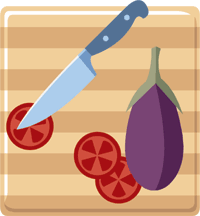Rewriting a Recipe
The year after she graduated from Vassar, Hillary Davis-Tonken ’82, now a freelance chef, attended the Culinary Institute of America. She expected to meet creative people like herself who were looking to turn a passion for food into a career. Instead she found mostly male 18-year-olds who were looking for more earning power in the restaurant and hotel industry, and a classroom where the inquisitive nature Vassar had nurtured was no longer encouraged. “It was a rude awakening,” she recalled. “As soon as I said I was a Vassar graduate, I was shunned.”
While culinary school is still “not for the weak of heart,” as Davis-Tonken put it, her profession has evolved a lot since her career began. Elise Moritz Blam ’83, co-owner of Going Gourmet catering in Atlanta, agreed. “I think it has changed in that being a chef is recognized as something that’s challenging, interesting, and takes more than just being able to make a soufflé.”
This wasn’t Blam’s experience when she decided to leave a successful, lucrative career in real estate investment to go to culinary school. “As far as my family was concerned,” she said, “it wasn’t a real job, it was for somebody who didn’t go to a liberal arts school like Vassar. They never realized, until I started my own business, how much I use all the skills I’ve acquired through education and business experience.”
“When I first started in the business,” said J. Ashley Sharpe ’85, executive chef at McCafferty’s in Baltimore, Maryland, “it didn’t have the respectability that it does now.” Now people see “that cooking can be a professional career, whereas before, when I said I cooked for a living, people had this Mel’s Diner idea.”
Moreover, what has historically been a male-dominated field is now seeing more women carving their own niches. Blam suggests this is in part due to entrepreneurial women like herself, who “had the means to make a transition into a culinary field because of success in a prior field.” While most of the prominent chefs in big cities are still men, women are beginning to find their place in the world of food in other innovative ways.
Deborah Drinker ’71, a pastry chef in Northampton, Massachusetts, knew that the hours involved in restaurant work wouldn’t be practical for a mom. “That’s when I started a business making specialty desserts and wedding cakes,” she said. She also teaches baking, which allows for a flexible schedule and weekends off. She is optimistic that the culinary career track is slowly changing. “Like with any business,” she said, “as more and more women run kitchens, it’s going to become more flexible as far as hours are concerned.”
Said Davis-Tonken, “I’ve found that the best thing for me is to always do about five different things.” Twenty years ago, she started in restaurants, but soon tired of the long, arduous hours. Then she worked as a food stylist, and while the work was creative and more lucrative than working in a kitchen, she said,

After taking time off to start a family, Davis-Tonken now works as a personal chef and cooking instructor. Still, she said, this is not a profession she’d ever choose for her children. “It’s very little glamour,” she said, “except at the very highest levels. And even then, unless you’re out of the kitchen…signing books and on TV, you still have to run a business.”
Drinker says many of the students she meets at the Cambridge School in Massachusetts, where she teaches baking, are deceived into illusions of stardom by culinary celebrities like Emeril (or Vassar’s own Anthony Bourdain ’77). “Some of them think they’re going to be Jacques Pepin next week,” she quipped. Added Sharpe, “It doesn’t work that way. It’s a business where you have to take your knocks.”
No one hesitates to mention the knocks: long days, odd hours, and for a profession that many perceive as glamorous, a heavy dose of physical labor. But neither do they hesitate to answer when asked what keeps them interested in their work: “Food,” Sharpe replied matter-of-factly. “There’s a certain high when the night’s over and you’ve turned the dining room twice and it moves like clockwork.” Sharpe thrives on the multi-tasking and organization his work requires. “In some ways I think there is a beauty to watching a well-run kitchen work. It’s almost like a ballet.” The instant gratification of cooking, the immediacy of the work (“you don’t have a chance to procrastinate”), and the opportunity to work with his hands all make cooking “a very exhilarating business.”
This exhilaration is never more present than when Sharpe is working on a benefit or volunteer project. At an organization in Baltimore called Operation Front-Line, he teaches single mothers on assistance how to feed their families nutritiously and economically. He also cooks for benefits, such as a million-dollar fundraiser for cystic fibrosis. “It’s not easy,” he said, “because it takes time and energy on top of what you’re already doing, but it’s very gratifying.”

While Blam’s catering business is her sole focus, she still wears many different hats. “I review our legal contracts,” she said, “and in a lot of cases I’ve written them myself. I [handle] a lot of the business relationships with purveyors; I do a majority of the food preparation myself, too. In the business world…you don’t really feel you’re creating something on a day-to-day basis,” but cooking, she said, offers her the chance to use her business skills and be creative all at once.
Blam’s love of cooking carries over to family gatherings, where she’s the chef, but “everybody participates.” She said, “Part of the allure of being in this business is that you’re creating an event with the food. It’s much more than what you put on the plate. That’s the fun of it.”
Pardes ’95 is a graduate student and freelance writer living in New York City. She is a frequent VQ contributor.
